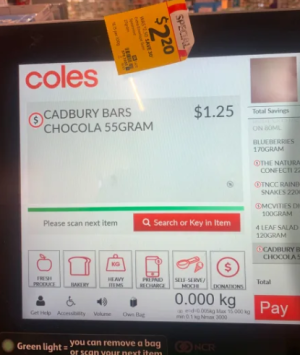Coles shopper pulls off act of rebellion against supermarket giant
By
- Replies 29
In an era where surveillance is becoming increasingly pervasive, one Coles customer has taken a stand against the constant monitoring at self-serve checkouts.
His act of defiance? Taking back a bit of his privacy.
The customer, who wished to remain anonymous, shared an image on social media of his unique tactic.
'This is how I dealt with not wanting the camera on me at the checkout at Coles tonight,' he said, showing that he placed a special ticket over the camera at one self-checkout terminal.
However, the reality is that customers are under surveillance from the moment they step foot in the store.
Overhead cameras monitor how products are scanned and what may have been left in your basket. If anything seems amiss, a staff member is alerted to investigate.
This customer's act may be more reflective of a broader frustration with the 'anti-theft' measures being used in supermarkets across the country.
'No one likes to be watched. Cameras impinge on our privacy,' UNSW Business School Professor Nitika Garg told a news source.
'We, as consumers, are unsure (of) how that data is being used. Not having an explanation or little reassurance is adding to the negative reaction.'
Coles and Woolworths have signs in-store to inform shoppers of the newly implemented technology, and have settled the 'strict privacy protocols' they adhere to with the videos.
They claim that the AI technology at self-serve checkouts doesn’t collect sensitive biometric data or keep personal information.
However, Digital Rights Watch has described the existing state of surveillance being used by Coles as 'invasive'.
Samantha Floreani, Program Lead at Digital Rights Watch, told a news source: ‘Between CCTV, overhead and face cameras at checkouts, sensors and beacons that track people through stores, AI-assisted checkouts, smart gates, licence plate recognition, data-hungry loyalty programs, and data-driven “crime intelligence” software, supermarkets are an environment in which just an incredible amount of data collection and surveillance is happening.’
Floreani argues that shoppers should be able to do 'basic life essentials' like shopping without being constantly monitored.
However, given the widespread nature of surveillance, consumers have little choice but to accept it. 'These approaches add up to the normalisation of surveillance,' Floreani said.
‘Plenty of shoppers may not even be aware that it's happening and, even if they are and are uncomfortable with it, may have no choice but to continue to shop there because of the lack of competition.’
Coles and Woolworths have also stated that self-serve checkouts’ cameras do not record, and they do not save the videos.
The exact purpose of the front-facing cameras remains undisclosed, but it’s likely they serve as a deterrent, causing potential thieves to think twice.
This incident comes as self-serve checkouts come under fire as a 'failed' experiment that does not benefit the most consumers.
Chris Andrews, Associate Professor and Chair of Sociology at Drew University in New Jersey, suggested that businesses view consumers tending to themselves at the checkout as free labour.
He advised those who disagree with the situation to 'vote with their pocketbooks'—and shop elsewhere.

What are your thoughts on this issue, members? Do you feel comfortable with the level of surveillance in supermarkets? Have you ever felt the urge to cover the camera at a self-serve checkout? Share your experiences and opinions in the comments below.
His act of defiance? Taking back a bit of his privacy.
The customer, who wished to remain anonymous, shared an image on social media of his unique tactic.
'This is how I dealt with not wanting the camera on me at the checkout at Coles tonight,' he said, showing that he placed a special ticket over the camera at one self-checkout terminal.
However, the reality is that customers are under surveillance from the moment they step foot in the store.
Overhead cameras monitor how products are scanned and what may have been left in your basket. If anything seems amiss, a staff member is alerted to investigate.
This customer's act may be more reflective of a broader frustration with the 'anti-theft' measures being used in supermarkets across the country.
'No one likes to be watched. Cameras impinge on our privacy,' UNSW Business School Professor Nitika Garg told a news source.
'We, as consumers, are unsure (of) how that data is being used. Not having an explanation or little reassurance is adding to the negative reaction.'
Coles and Woolworths have signs in-store to inform shoppers of the newly implemented technology, and have settled the 'strict privacy protocols' they adhere to with the videos.
They claim that the AI technology at self-serve checkouts doesn’t collect sensitive biometric data or keep personal information.
However, Digital Rights Watch has described the existing state of surveillance being used by Coles as 'invasive'.
Samantha Floreani, Program Lead at Digital Rights Watch, told a news source: ‘Between CCTV, overhead and face cameras at checkouts, sensors and beacons that track people through stores, AI-assisted checkouts, smart gates, licence plate recognition, data-hungry loyalty programs, and data-driven “crime intelligence” software, supermarkets are an environment in which just an incredible amount of data collection and surveillance is happening.’
Floreani argues that shoppers should be able to do 'basic life essentials' like shopping without being constantly monitored.
However, given the widespread nature of surveillance, consumers have little choice but to accept it. 'These approaches add up to the normalisation of surveillance,' Floreani said.
‘Plenty of shoppers may not even be aware that it's happening and, even if they are and are uncomfortable with it, may have no choice but to continue to shop there because of the lack of competition.’
Coles and Woolworths have also stated that self-serve checkouts’ cameras do not record, and they do not save the videos.
The exact purpose of the front-facing cameras remains undisclosed, but it’s likely they serve as a deterrent, causing potential thieves to think twice.
This incident comes as self-serve checkouts come under fire as a 'failed' experiment that does not benefit the most consumers.
Chris Andrews, Associate Professor and Chair of Sociology at Drew University in New Jersey, suggested that businesses view consumers tending to themselves at the checkout as free labour.
He advised those who disagree with the situation to 'vote with their pocketbooks'—and shop elsewhere.
Key Takeaways
- A Coles customer has shared an image of him covering the camera at a self-serve checkout in an act of defiance against being recorded.
- The customer's action highlights the broader frustration among Australians with the level of surveillance in supermarkets.
- Despite privacy concerns, Coles and Woolworths maintain that their AI technology at checkouts does not collect sensitive biometric data or store personal information.
- Some have criticised the increased use of self-service checkouts as a measure that benefits businesses but potentially treats customers as free labour.
What are your thoughts on this issue, members? Do you feel comfortable with the level of surveillance in supermarkets? Have you ever felt the urge to cover the camera at a self-serve checkout? Share your experiences and opinions in the comments below.








